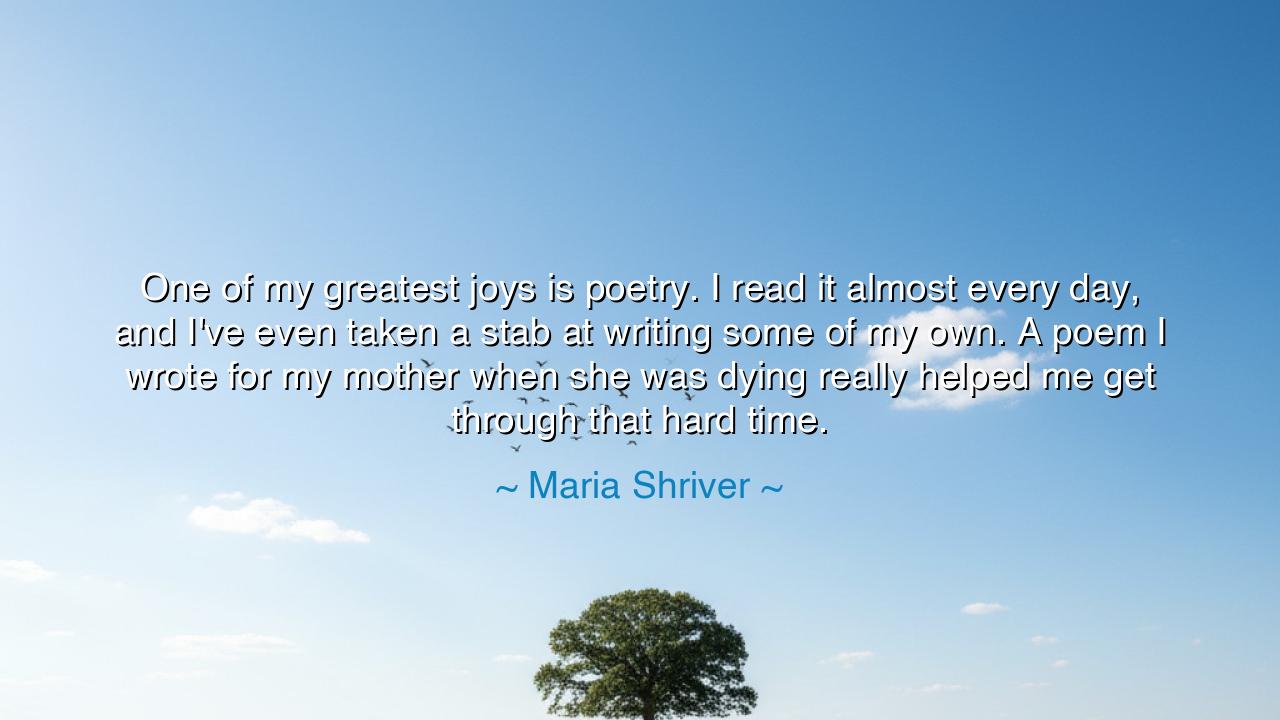
One of my greatest joys is poetry. I read it almost every day
One of my greatest joys is poetry. I read it almost every day, and I've even taken a stab at writing some of my own. A poem I wrote for my mother when she was dying really helped me get through that hard time.






“One of my greatest joys is poetry. I read it almost every day, and I've even taken a stab at writing some of my own. A poem I wrote for my mother when she was dying really helped me get through that hard time.” Thus speaks Maria Shriver, her words carrying the weight of love, grief, and consolation. In this confession, she shows us that poetry is not only a craft of beauty, but also a vessel of healing. It is the thread we weave when our hearts are frayed, the voice we call upon when ordinary speech fails before the mystery of suffering and loss.
The meaning of this saying lies in poetry’s sacred role as companion in grief. At the bedside of the dying, words often abandon us; silence feels both too heavy and too light. Yet poetry steps in, shaping sorrow into rhythm, giving pain a pattern, offering the mourner a way to breathe again. For Shriver, the act of writing was not about literary achievement but about survival—an inner necessity that transformed despair into a form that could be carried. In this, she joins the countless souls across time who have turned to poems not only to celebrate life but also to endure death.
The origin of this practice is as ancient as humanity itself. In every culture, when death entered, people turned to verse. The Egyptians carved lamentations for their dead pharaohs; the Greeks composed dirges; the Hebrews sang psalms of mourning; the Japanese whispered death haikus. These were not written to impress, but to endure. The rhythm of poetry gave structure to grief, making the unbearable bearable. What Shriver experienced at her mother’s passing is the continuation of this ancient lineage: poetry as solace in the face of mortality.
History offers the example of Alfred, Lord Tennyson, who, upon the death of his beloved friend Arthur Hallam, composed In Memoriam A.H.H. That vast poem became not only a monument to his friend but also a salve for his own heart. Through writing, he found a way to wrestle with questions of faith, grief, and hope. His sorrow was immense, but his words transmuted it into endurance. Just as Tennyson survived his grief through verse, so too did Shriver survive her hardest hour by writing for her mother.
The lesson here is luminous: when life breaks us open, we must not remain silent. To grieve without words is to drown in formless waters. But when we give voice to our pain—even haltingly, even imperfectly—we begin to rise. Poetry is not the privilege of the few but the refuge of all. You need not be a poet to write a poem; you need only a heart that trembles before love and loss.
Practically, this calls us to action: make poetry part of your daily walk, as Shriver does. Read a poem each day, and let it be bread for your spirit. When joy comes, celebrate it in verse. When grief comes, pour it into lines. If you cannot write, speak aloud words of others, and let their rhythm hold you. For in doing this, you cultivate a practice that will sustain you in both light and shadow.
Thus the teaching endures: poetry is not only beauty, but medicine. It carries us through the valleys of loss, restores us when the weight of sorrow seems too great, and reminds us that even in death, love can be spoken. As Shriver discovered, a single poem written for the dying can be a lantern for the living. Let us then honor this gift, using poetry not merely to adorn life, but to survive it with grace.






QHQuoc Huy
This quote makes me think about the accessibility of poetry for everyone, not just professional writers. Does Shriver’s experience suggest that even brief or imperfect attempts at writing poetry can provide comfort in moments of grief? Could encouraging people to write for personal reflection help them process emotions and cope with loss? I also question whether the act of daily engagement with poetry creates a cumulative benefit, strengthening resilience over time.
MPBui Minh Phuc
From a reader’s perspective, this statement raises questions about the dual role of poetry as both art and emotional support. Is the joy of reading poetry enhanced by the understanding that it can also serve as a tool for personal healing? I also wonder how personal the poem Shriver wrote must have been, and whether its therapeutic value comes from crafting language to capture feelings that are otherwise difficult to articulate.
LHLe Hien
I’m struck by how Shriver uses poetry as a coping mechanism. Could writing a personal poem create a lasting memory or tribute that helps preserve connection with a loved one? I also wonder whether the process of writing poetry for difficult experiences is universally helpful, or if it depends on one’s comfort with creative expression. How might poetry offer both emotional release and reflection in a way that journaling or conversation might not?
APAn Phung
This quote really highlights the emotional power of poetry. I wonder if the act of writing for someone personally significant, like her mother, provides a form of therapy that reading alone cannot offer. Does engaging with poetry in times of grief help process emotions more effectively than other forms of expression? I also question whether poetry’s structure and rhythm contribute to its healing properties, giving a sense of order in an otherwise chaotic emotional experience.